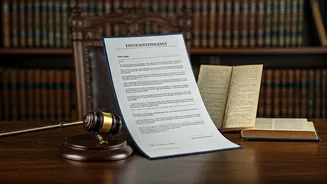Clarity is Paramount
One of the most frequent missteps in will creation is a lack of clarity. Ambiguous language or confusing phrasing can open the door to disputes among beneficiaries,
resulting in costly legal battles and potentially thwarting the testator's original desires. It's imperative that the will's language is precise, using unambiguous terms to define the distribution of assets. Instead of using vague terms like "personal belongings," a will should specifically itemize assets such as specific properties, stocks, or bank accounts. This precise approach leaves little room for interpretation. Consider the case of a will that simply stated, "I leave my car to my nephew." This can lead to ambiguity: Does it include the car's title, insurance, or other associated items? To combat this, one can include the car's model, year, and vehicle identification number. Moreover, be sure that the beneficiaries are named distinctly, with their full legal names. This helps avoid confusion with others who might share a similar name. It is also beneficial to avoid using nicknames or informal identifiers. All these details play an important role in avoiding disputes and making sure your wishes are clearly understood and correctly implemented.
Proper Execution Matters
Proper execution of a will involves meeting stringent legal requirements designed to validate the document and make it legally binding. This means strictly adhering to state-specific regulations regarding signing and witnessing. A common mistake is failing to have the will properly witnessed and signed, which can render it invalid. In most jurisdictions, the testator (the person making the will) must sign the document in the presence of two or more competent witnesses, who must also sign the will in the testator's presence. These witnesses should not be beneficiaries of the will to avoid any conflict of interest. Failing to meet these requirements can lead to the will being contested in court. It is essential to understand the specific laws of the state where the will is being executed. Some states might require additional steps, such as having the will notarized. For example, some jurisdictions might require that witnesses be of a certain age or that they understand the nature of the document they are witnessing. If the execution process is not performed properly, the will might be deemed invalid, and the estate will be distributed according to the state's intestacy laws, which may not align with the testator's wishes. Therefore, seeking legal counsel during the execution phase is strongly recommended to ensure compliance.
Ignoring Regular Review
Life changes can significantly impact the relevance of a will. Ignoring the need for periodic review and updates can be a serious mistake. A will should be reviewed and updated regularly to reflect significant changes in the testator’s life, such as marriage, divorce, the birth or adoption of children, or the death of a beneficiary. Without these updates, the will may no longer accurately reflect the testator's wishes. For instance, if a person marries after creating their will, and the will does not mention the spouse, the spouse might not receive any inheritance, which is likely not the testator's intention. Similarly, if a beneficiary dies before the testator, the will needs to be updated to designate a new beneficiary. The acquisition or disposal of significant assets can also necessitate revisions to the will. A home purchase, for example, would call for the will to be updated to include it. Furthermore, changes in tax laws might affect how assets are distributed. Regular reviews, ideally every three to five years, or whenever a major life event occurs, are necessary. This ensures that the will remains current and effective in carrying out the testator's desires, helping to prevent potential disputes or legal challenges in the future.
DIY vs. Legal Counsel
Attempting to draft a will without professional legal advice can be risky. While DIY will kits and online templates are available, they might not address the complexities of individual situations and specific state laws. A significant pitfall is the failure to consider all relevant legal requirements, which vary significantly by location. DIY approaches might not account for complex situations, such as blended families, business ownership, or significant assets. These situations often require tailored legal solutions to ensure a smooth transition of the assets. A lawyer experienced in estate planning can provide personalized guidance, considering all relevant legal considerations. They can identify potential issues and offer solutions that a standard template might not cover. Moreover, a lawyer can ensure that the will complies with all applicable laws and regulations, reducing the risk of challenges. Seeking legal counsel also ensures that the will is correctly executed, minimizing the risk of errors that could render the will invalid. A legal professional can also advise on other estate planning tools, such as trusts, which might be more appropriate for certain situations. Although engaging an attorney might involve an upfront cost, the investment can save considerable time, money, and stress down the line. It protects your assets and your loved ones.
Choosing the Right Executor
The selection of an executor is another critical step, and making a poor choice can lead to significant problems. The executor is responsible for managing the estate, paying debts, and distributing assets according to the will's instructions. A common mistake is choosing an executor who is not capable, willing, or available to carry out these responsibilities. The executor should possess traits such as financial acumen, organizational skills, and the capacity to deal with complex issues and potential conflicts. Consider the time commitment involved, as the executor's duties can take considerable time, particularly for larger estates. It is wise to have an alternate executor as a backup in case the primary choice is unable or unwilling to serve. Make sure to discuss the role with your chosen executor and ensure they are comfortable with the responsibilities. It's often helpful to include instructions in the will detailing the powers and limitations of the executor, clarifying how specific tasks should be performed, such as selling assets or managing ongoing business interests. Finally, regularly review the appointment. As personal relationships and circumstances change, you might need to adjust your choice of executor to ensure the estate is managed effectively and efficiently.














